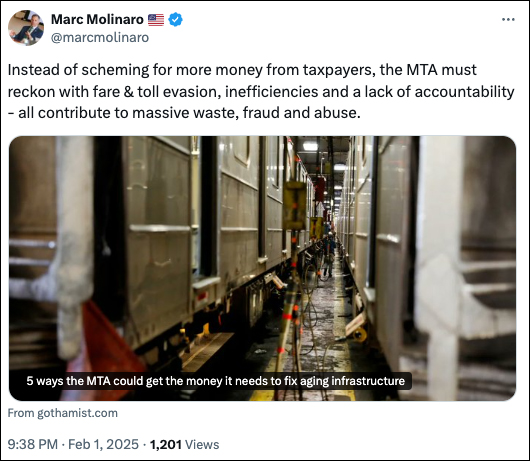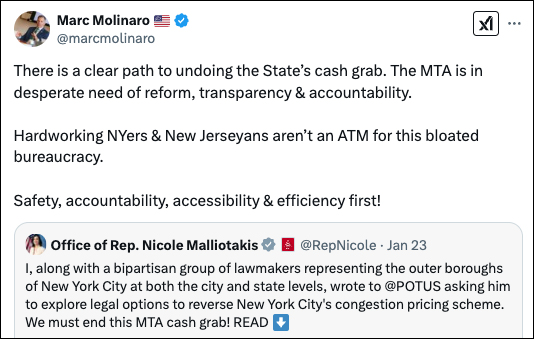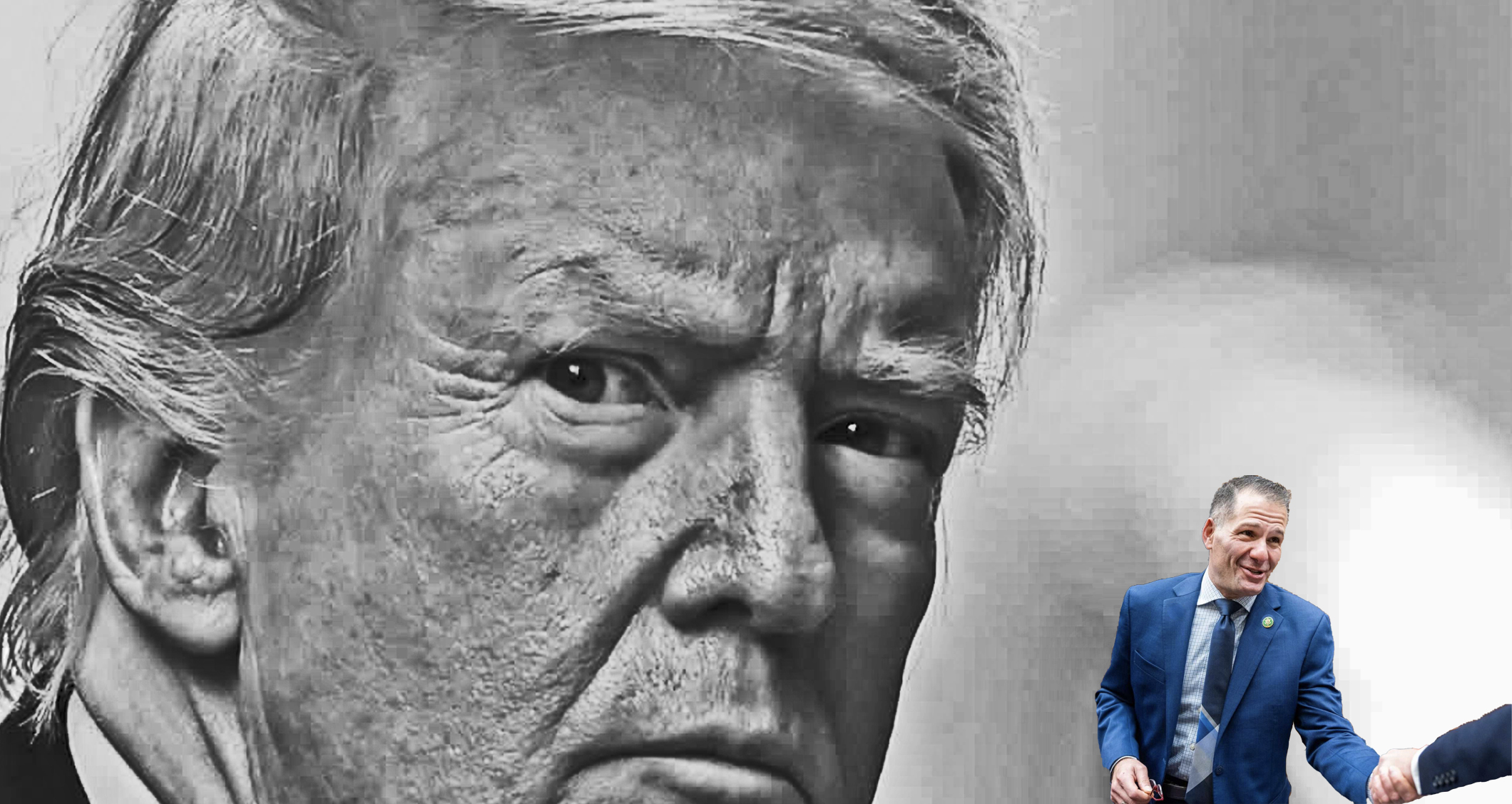Will the real Marc Molinaro please stand up ... and if he does, can he stand up to Donald Trump?
Molinaro, the former upstate New York congressman and the president's pick to head the Federal Transit Administration, has been a chameleon on public transit over his long political career — but his transit-booster past may not matter if it clashes with his boss's priorities.
As a moderate candidate for governor in 2018, Molinaro put out a comprehensive plan for the New York City region's Metropolitan Transportation Authority that endorsed massive financial investment in improving subway service. He even backed some form of congestion pricing, which he framed as an alternative to higher taxes.
But as a MAGA-aligned representative running for re-election to the House in 2024, Molinaro struck a decidedly different tone, calling congestion pricing "a bad, unpopular idea to begin with" while reiterating his longstanding calls to take on "the waste, bloat, and corruption plaguing New York and the MTA." Last summer he called on Congress to hold a hearing on congestion pricing, which never happened.
Molinaro has continued his rhetorical assault on the MTA in the months since he lost his November re-election.
"Instead of scheming for more money from taxpayers, the MTA must reckon with fare and toll evasion, inefficiencies and a lack of accountability — all contribute to massive waste, fraud and abuse," he posted on X on Feb. 1 amid reports that Trump planned to nominate him to lead the FTA.

In January, he endorsed a letter from some New York elected officials to President Trump that suggested the federal government to use its powers under the National Environmental Policy Act to rescind its approval of the congestion tolls on car trips into Manhattan below 60th Street. Revoking federal approval was "a clear path to undoing the state's cash grab," he said.

Initial coverage of Molinaro's appointment focused on his opposition, at least of late, to congestion pricing, which launched in January. But the FTA has next-to-nothing to do with the tolls, which went through a different U.S. DOT agency, the Federal Highway Administration.
Instead, as FTA administrator, Molinaro would be responsible for allocating federal funding grants to the country's 3,500-odd transit systems. Most of those funds are essentially spoken for — determined by a formula set by Congress. Others are allocated through 10 competitive grant programs subject to review and approval by FTA leadership and staff.
His congestion pricing flip-flop aside, Molinaro supported transit as the chief executive of Dutchess County, home to several MTA commuter rail stations, according to Lisa Daglian, executive director of the Permanent Citizens Advisory Committee to the MTA.
But that past support may only go so far if federal transit grants wind up in the crosshairs of Elon Musk, a transit skeptic whose so-called "Department of Government Efficiency" has set out to slash federal spending, Daglian warned.
"He hasn't been somebody who has been all about driving. He has an understanding that people need to get to work, people need to get around and not everybody has a car," Daglian said. "He understands that bus routes need to be serviceable, that buses need to be bought ... that there needed to be train service, that there needed to be funding for train service. But look who his boss is."
Despite his riffs on MTA "corruption" and calls for "cost savings" at the agency, Molinaro has been an ally of the Transport Workers Union, whose members sit on the receiving end of much of those costs.
"Molinaro has an excellent voting record on transport workers' issues," TWU International President John Samuelsen told Streetsblog. "He understands the necessity of urban transport, and we are relying on him to be a voice of reason for workers, in a time of great uncertainty."
Still, Molinaro's anti-MTA and anti-congestion pricing screeds amount to him "reading from a playbook," Daglian said — an indication he's not likely to buck the Trump party line.
Ideally, Congress would reconsider how the FTA allocates grants in order to pump more money into large, transit-dependent regions and states, Daglian said. New York, for example, accounts for around 40 percent of the country's transit ridership, but receives 13 percent of formula funding for urban transit.
Existing formulas, however — coupled with Transportation Secretary Sean Duffy's call to funnel funding to states with high birth rates — mean New York and other states with declining populations may not be able to count on the feds to help address their transit funding needs. The first Trump administration effectively ignored New York and New Jersey's application for funding for a new tunnel under the Hudson River — driving up the project's cost before President Biden finally let the federal government chip in.
Biden officials managed to award the bulk of discretionary public transit funding from the 2021Infrastructure Investment and Jobs Act before they left office. Molinaro could simply sit on that — or refuse to disburse already approved funding, saddling transit agencies with costly IOUs. Duffy has already possibly signaled plans to renege on many of those funding agreements in his day-one "Woke Rescission" memo, which directed DOT bureaucrats to "identify and eliminate" any policies or initiatives that "reference or relate to climate change, greenhouse gas emissions, environmental justice, race, "gender identity" or DEI — a vague directive that Transportation for America's Beth Osborne feared might include "all of transit."
Transportation for America identified more than $20 billion in DOT disbursements to states and localities that could be at stake.
Whatever his past support for public transit, Molinaro faces gale force winds in Washington in the other direction. Administration officials have so far refused to comply with court orders to follow laws passed by Congress that contradict Trump's green scare agenda.
"We have reason to think he'll be thoughtful and generous — to the extent that he's able to," said Danny Pearlstein, communications and policy director for the New York City-based transit advocacy group Riders Alliance.
"Is the administration trying to impose a weird social-engineered vision of anti-transithood upon us? If that's true, then, you know, he's going to wish he had a different job."






